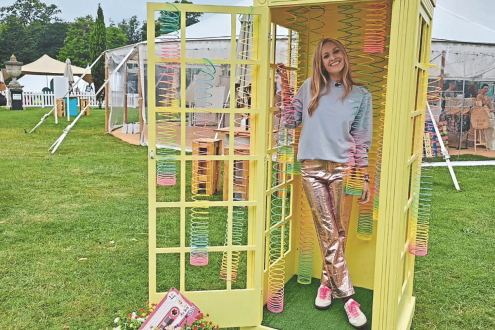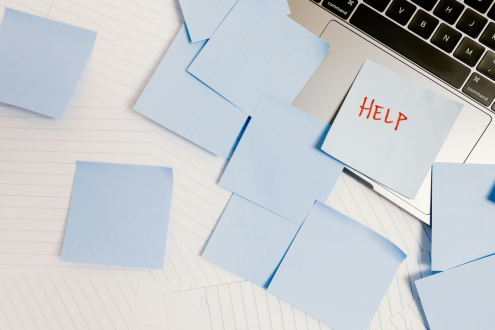Find your spark and use your intuition to reconnect with the real you
Facing a tough decision? Not sure which path to take? So often, the answer comes from a quiet voice within. But how do we get in touch with our intuition – and how do we know that what we are hearing is not anxiety or fear? Anita Chaudhuri asks the experts.

Find your spark
MANY VISIONARIES, from Albert Einstein to Oprah Winfrey, attribute the secret of their success to listening to that still, small voice within. Intuition allows you to reconnect with your power and creativity, the parts of you that make you unique and feel true to yourself. Yet, that inner voice and the wisdom it offers can be elusive…
In this guide, Anita Chaudhuri talks to the experts to discover strategies and tips on how to stop overthinking, access your intuition and find a path that is true for you. By following a daily practice of tuning inward, you can start to understand what it is that you’re yearning for in life, and take steps to make it happen. Learn wise habits that will stop you getting stuck in your mind, so you can allow your heart and feelings to guide you.
Intuitive wisdom
“While it might sound woo-woo to the uninitiated, many artists and entrepreneurs cite intuition as key to their success”
Does the following scenario sound familiar? You develop a hunch about something, perhaps a potential romantic partner, or a job opportunity that seems like a bit of a stretch. When you confide in friends and family, some react with scepticism, perhaps even an eye roll. But then, to everyone’s surprise, perhaps even yours, things turn out just the way you imagined.
Listening to that inner wise voice within can yield powerful results. And, while it might sound woo-woo to the uninitiated, many influential entrepreneurs and artists cite it as key to their success, including Steven Spielberg, David Lynch and Oprah Winfrey. Apple founder Steve Jobs went as far as to say: ‘Intuition is a powerful thing, more powerful than intellect, in my opinion.’
So, what exactly is intuition? Often referred to as a gut feeling or sixth sense, recent research published in Psychological Science defined it as a brain process that allows people to make decisions without employing the rational mind.
Experiments conducted by the University of New South Wales revealed that we can use unconscious information in the brain and body to guide us through life, enable better and faster decisions and become more confident about our choices. The research also indicated that intuitive skills get better when practised over time.
‘Learning to develop your intuition puts you back in charge of your life instead of feeling at the mercy of others,’ says Sonia Choquette, author of Ask Your Guides (Hay House, £12.99). ‘The more intuitive insight you have, the better decisions and choices you can make about your life – it’s empowering. It also helps you reconnect with parts of your authentic self that got railroaded by the opinions of other people.’ Choquette believes the easiest way to activate your intuition is via your imagination. ‘Every morning, say out loud all the things in life that you love: “I love a cup of strong coffee in the morning, I love my dog, I love silk pyjamas, I love flowers, I love laughing with my kids.” It’s important to say them out loud because you get them out of your head and into reality.’
Specificity is key here. The more detailed you make your daily love list, the more engaged you will become. By reminding yourself of what you love most in your life, you are giving yourself permission to have more of it.
I can attest to this, because I started doing this exercise at one of Choquette’s workshops several years ago. It was what inspired me to buy my first camera, paint my living room sunflower yellow and find my dream co-working space. What is the connection with intuition? It puts you back in touch with the things you are unconsciously yearning to experience.
What lights you up?
Choquette has seen the results among her clients. One woman she worked with in Chicago years ago had only two items on her list: ‘I love Oprah and I love Starbucks.’ Choquette suggested that maybe she should go and get a cappuccino and talk about her favourite talk show host. The woman did so, and struck up a friendship with another Starbucks regular who, by strange coincidence, happened to work for Oprah and offered her a job. Another client, recently widowed, could think of only one love in life, playing the piano, which she had abandoned. She bought a second-hand one, the man who sold it to her offered to give her lessons and they ended up married.
‘People talk about FOMO (fear of missing out), but the real FOMO I see is that if people don’t pay attention, they could miss out on their own authentic life by paying too much attention to the lives and opinions of others,’ says Choquette. ‘Connecting with your intuition offers a powerful remedy for that.’
Actually learning to use your intuition in the moment can be challenging though. We may have a strong feeling about something that defies all logic, but how can we learn to trust that? The following steps are designed to help you learn to hear your vibes and act on them.

Let your inner voice be your guide
Intuition is an innate skill that helps you choose what is right for your life and will, ultimately, make you happier. The experts share how to tap into and believe in your gut instinct to flourish.
OVERCOME YOUR BLOCKS
“In the West, the history of the patriarchy has historically sought to outlaw our connection with intuition”
One of the most common blocks to listening to your intuition is a preoccupation with the opinions and judgments of others, believes psychotherapist Lizandra Leigertwood. ‘Fear of letting people down by not living up to societal, cultural or parental expectations is a common block.’
This can be particularly true if you come from a background where there were rigid expectations about what success should look like. ‘In those cases, people don’t allow themselves to dream because they’re fulfilling the dreams of their parents instead of their own.
A person will come to see me and, although things might look great on paper – maybe they have an amazing career and family – they feel unhappy and burned out because they’ve been on a journey of people pleasing for so long. They’ve shrunk their authentic self because they’ve been so busy listening to others instead of their own inner wisdom.’
Another common block is focusing too much on logic. ‘In the West, we grow up in a school system where the focus is on the rational, and academic success is measured by listening to and repeating the opinions of others,’ says Amisha Ghadiali, author of Intuition: Access Your Inner Wisdom, Trust Your Instincts, Find Your Path (Dorling Kindersley, £14.99).
‘If something can’t be explained by data and evidence then it’s not to be trusted; add to that the history of the patriarchy, which has historically sought to outlaw our connection with intuition.’
Square peg, round hole
Ghadiali, who has a politics degree, struggled to overcome such blocks while launching her career as a jewellery designer, yoga teacher and author. ‘I had to work through a huge amount of fear over what success is supposed to look like. It often felt as if I was living life at odds with how I really felt inside. I knew I was doing things that weren’t right for me – staying in a relationship that wasn’t right or taking a certain job, even eating certain types of food. In so many small ways, I was betraying my intuition in order to fit in and get that validation we’re all looking for. Eventually, it became impossible to live like that.’
There is another common block to being open to intuitive guidance, says Choquette. ‘The unknown can be scary, so we close off the guidance. For anyone who is feeling this way, I would advise – just be curious. You don’t have to act on your hunches. Start by experimenting with simply paying attention to how you feel.

LEARN TO TRUST YOUR INTUITION
“Ask whether you should take the job; it won’t say yes on Monday, no on Tuesday and maybe on Wednesday. It’ll say yes every time you ask. That’s how you know”
A major question that can arise when working with intuition is whether your instincts are real intuition or mere overthinking – at one end of the spectrum, wishful thinking, and, at the other, catastrophising. One way to become more discerning is to check in with your intuition regularly. ‘The way to distinguish intuition from mental chewing gum is that it is consistent,’ explains Choquette. ‘If you check in and ask whether you should take the job, it’s not going to say yes on Monday, no on Tuesday and maybe on Wednesday. It will say yes every time you ask. That’s how you know.’
Emergency measures
It is important to be aware of how you feel. ‘Your intuition is definitely going to function best when you are in a calm mental and physical state,’ says Ghadiali. ‘If you’re unduly stressed about money or a health diagnosis, be aware that there might be a lot of fear coursing through your system that can act as a block to listening to yourself.’
It may be better to wait until you feel calmer – but not always. ‘However,’ Ghadiali continues, ‘intuition can also come to help you in those moments of crisis with clear, simple direction that is very different from mind chatter. I’ve heard many stories of people hitting rock bottom, then receiving an unexpected flash of insight that appears to come out of the blue. But, if you develop a regular daily practice of tuning in, then you won’t have to wait for a crisis for it to come through.’
It can be particularly challenging to trust your intuition when you’re surrounded by naysayers and sceptics. How do you deal with that? ‘First, you can pretty much count on your intuition not being supported,’ says Choquette. ‘There’s a high probability of having others dismiss or ridicule you, or being told that you’re weird or unrealistic. Learn to keep your ego out of such conversations and go for a gentler approach. Tell the other person: ‘I know it sounds crazy, but this feels right for me.’ There’s no point in trying to make them agree with you or tell you that you’re right.’
If at first you don’t succeed…
An occupational hazard of living by one’s instincts is sometimes getting things wrong. Intuition is not infallible, but dwelling on mistakes can paralyse you and prevent you continuing to be open to inner wisdom. When things go wrong, ‘it’s important to remind yourself that mistakes are there to learn from,’ says Leigertwood. ‘If you can reframe those experiences as occasions where you learned something – rather than viewing them as negative – you can build trust in yourself.’
It’s also important to practise self-compassion and understand that we can only do the best we can with the knowledge we had at the time. ‘Sometimes we might feel certain about a situation, but our action was limited to what we knew in that moment,’ says Leigertwood. ‘OK, so you might have made choices in the past that you would make differently today, but the only way you’re going to learn is by living and by trusting. If you’re constantly living in fear of making a mistake, your life isn’t going to feel like your own.’
ACT ON YOUR INTUITION
“You have to be prepared to swallow the truth serum, you can’t fool your inner self”
It’s important to bear in mind that being aligned with your intuition is unlikely to give you a magic wand allowing you to bypass the hard work necessary to turn your dreams into reality. ‘What it does do is put you back on the right path. And it can also save you a lot of wasted time and effort,’ says Choquette.
An exercise that Choquette suggests is to journal about an issue that you’re facing. Write down all the fears that arise while contemplating it. Then, say out loud the prompt: ‘If I weren’t afraid, I would…’ and fill in the blank. Repeat this for five minutes, and do the exercise for 30 days. ‘This is what I’m afraid of and this is what I would do if I wasn’t afraid.
When you name it, you claim it. A deeper truth will emerge concerning what your heart truly desires, and what steps you should take in order to get there. You will have a visceral experience of your true self.’
The right direction
Taking action as soon as you get guidance is key, says Ghadiali. ‘Intuition loves action, but if that sounds overwhelming, it shouldn’t be. Your intuition usually gives you a nudge to do the next right step – a small, doable action. It isn’t necessarily going to give you a 10-year plan with all the details at once, it’s going to give you one step and, when you embrace that, it will give you the next, and the next.’
If the pandemic has taught us anything, it is how to live with uncertainty. ‘The actual facts of our lives haven’t changed. Pre-pandemic, you could get fired at any moment or your marriage could implode at any time. What’s changed is that the unpredictable nature of life has been brought to the surface for all of us,’ explains Ghadiali. ‘But, when you’re living a more intuitive life, you don’t need to have everything clearly mapped out. You might hold a bigger vision of how you want your life to be but you’re building a relationship with trust and allowing things to come into your life that you might not have thought of welcoming before.’
Another key skill is to ask the right questions, says Choquette. ‘You can only act on your intuition if you are asking questions that you are willing to address. You have to be prepared to swallow the truth serum – you can’t fool your inner self.’ So, instead of agonising over a dilemma such as should you leave your job to become a chef, she suggests asking a less dramatic question. ‘Ask, what does your intuition have to say about you becoming a chef? In this case, my client got a clear answer: “I don’t have the skills.” So, rather than the disruption of quitting her job, she signed up for part-time training while continuing the day job. It’s more helpful to do the next right thing and break the issue down into bite-sized, manageable chunks.’
soniachoquette.net; newframetherapy.co.uk; amisha.co.uk

Five strategies for intuitive living
Authors Sonia Choquette and Amisha Ghadiali explain how to access your inner wisdom using your senses and emotions, so you can make decisions and take action with confidence
- Listen to your body
‘Every morning, place a hand on your heart and ask, ‘What is my guidance today?’ Listen to what arises without judgment. Then, check in with your body. Intuition has a particular signature – your body relaxes. It can feel a little like putting a key in a lock. By contrast, if you’re overthinking, your body feels agitated and your mind spins,’ says Sonia Choquette.
- Focus on what feels true
Build on the above exercise by focusing on a particular dilemma, while saying aloud: ‘My head says…?’ and ‘my heart says…?’ A common fear is getting it wrong. ‘I say the world of right and wrong is a faculty of the intellect,’ says Choquette. ‘Intuition comes from a different place, a third space which is what feels true for me, for now. You step into a doorway of what feels true.’
- Set a yoga intention
‘Ask a question in the form of an intention before you start your yoga practice,’ suggests Amisha Ghadiali. ‘Begin by stating that you would like to find out X from the wisdom held in your body, then invite the question in and move through your sequence. When you come out of it, see if an answer has landed in your mind.’
- Identify your intuitive style
‘Some people receive it as pictures in their mind, for others they may hear guidance or even taste it,’ says Ghadiali. To identify your intuitive style, journal about a perfect Sunday that you enjoyed recently. Describe it in detail and either write it down or record it. Notice what feeling words you use most – visual, auditory or kinaesthetic. This should give you a valuable clue about what form of intuition you should pay most attention to in the future.
- Start an intuition journal
‘Write down your hunches and collect data that can help your rational mind work with your intuition. How did you feel? Where did you feel it in your body? What was the outcome? That way, you start to collect how information comes through for you and distinguish between the voice of your ego, mental chatter and overthinking,’ says Ghadiali.

TAP INTO YOUR INTUITIVE POWER In our free four-week coaching course, ‘Find your spark’, exclusive to ‘Psychologies’ subscribers, in-house coach Nikki Peterson will look at how letting your heart and feelings guide you – instead of your head – can bring you untold rewards. The programme will provide practical ways to stop overthinking, regain your spark and reconnect with your true self by letting go of the mental chatter that holds you back. By letting your body guide you, you can journey towards what truly makes you happy.
Images – Getty Images









